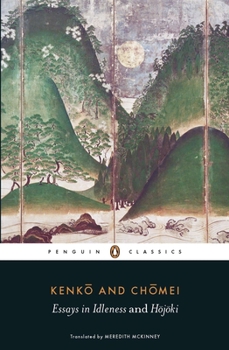Book Overview
Two of the most important Buddhist tracts from Japan A Penguin Classic Both of these works on life's fleeting pleasures are by Buddhist monks from medieval Japan, but each represents a different worldview. In Essays in Idleness, his lively and sometimes ribald collection of anecdotes, advice, and observations, Kenko displays his fascination with earthly matters. In the short memoir Hojoki, or The Ten Foot...
Format:Paperback
Language:English
ISBN:0141192100
ISBN13:9780141192109
Release Date:July 2014
Publisher:Penguin Group
Length:224 Pages
Weight:0.40 lbs.
Dimensions:0.6" x 4.9" x 7.6"
Age Range:18 years and up
Grade Range:Postsecondary and higher
Related Subjects
Friendship Love Simplicity Essay Nature's Beauty Asia Asian Buddhism Criticism & Theory Education & ReferenceCustomer Reviews
3 ratings
Quiet and quirky
Published by Thriftbooks.com User , 20 years ago
Much of this little book works as well today as seven hundred years ago, when it was written. The observations on people and their manners sound a little old-fashioned, but still applicable.At another level, this book is credited with the first clear statements of esthetic principles that guide modern Japanese design. The translator's footnotes show how it draws on works from Confucius, Lao Tzu, and other Chinese classics in building a uniquely Japanese text. I believe the translator missed an allusion to Chuang Tzu in essay number 42, but that does not detract from the generally high quality of scholarship in this presentation. This is a remarkable, first-person statement of the sources of Japanese culture.Finally, these essays are uniquely products of their place and time. Kenko's view, as a monk, of the secular world affects nearly every essay. Shonagon's 'Pillow Book' introduced me to traditional Japanese literature. This book, with all its similarities and differences, is a wonderful way to continue that friendship.
A delicious little book
Published by Thriftbooks.com User , 23 years ago
The Wordsworth Classics here presents a nice translation by G.B. Sansom of a classic, the Tsurezuregusa of Yoshida Kenko, written around 1330 by a Japanese monk. The format of the work is reminiscent of the Pillow Book of Sei Shonagon - short observations, bits of memoir, commentary on the manners and morals of people around him.There's a minimum of footnoting and the translator's style is smooth and readable. It's a dipping book which will appeal to modern Buddhists and pensive readers alike. As Kenko himself says:"To sit alone in the lamplight with a book spread out before you, and hold intimate converse with men of unseen generations - such is a pleasure beyond compare."
Kenko's Time-capsule: A Cultural Survey
Published by Thriftbooks.com User , 25 years ago
Anyone interested in or studying Japanese history/literature/culture should read this book. It contains a series of short essays (zuihitsu) and reads much like Sei Shonagon's Pillow Book. These essays range from Kenko's moral opinions about various aspects of life to his aesthetic tastes and thoughts about beauty. These essays are Kenko's opinion, yet they can be taken as the opinions of Japan's society at the time of the writing. Therefore there is a great deal of interesting cultural information and meaning behind Kenko's words. So if you are interested in Japanese Buddhism or religion, this book's a must.If you are interested in Japanese aesthetics- aware: the idea that beauty is transient/fleeting, wabi-sabi: by becoming aged and through use, an object's history and experience bestow upon it greater value than an object that is new, the idea that uncertainty/non-uniformity/ and incompletion can inspire imagination- by all means read this.





